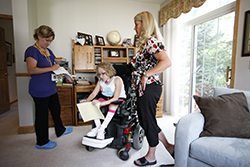Preparing for a Successful School Year, With PACER

Many students packed up their backpacks and got on the bus for another great year today – but for many of our families, this can also mean a lot of time spent worrying. Something was forgotten, a health care professional wasn’t contacted, or maybe your child will need assistance at school and won’t know how to ask. To help make sure you have peace of mind and go into the upcoming year feeling confident, we asked two extremely knowledgeable groups of people – PACER Center and PHS families – what is on their ‘to do’ list to help create success at school.
From PACER, who provides assistance.
The beginning of the school year can be a time of stress and anxiety for both children and their parents. This is especially true for families of children with disabilities and complex health care needs. PACER Center, which is a parent center for families of children and young adults with any disability, has compiled the following tips to help families start the school year on the right foot.
- Introduce yourself to your child’s teachers and nursing staff as early as possible and make sure to attend any open houses or meetings at the school.
 Communicate important information about your child to the school, but avoid giving too much information. Because time is often in short supply for both you and school personnel, it’s important to deliver this information quickly and concisely. PACER’s Student Snapshot will help you develop a one-page document that you can give to anyone who might interact with your child, including teachers, paraprofessionals, nurses, lunch room staff, bus drivers, and others.
Communicate important information about your child to the school, but avoid giving too much information. Because time is often in short supply for both you and school personnel, it’s important to deliver this information quickly and concisely. PACER’s Student Snapshot will help you develop a one-page document that you can give to anyone who might interact with your child, including teachers, paraprofessionals, nurses, lunch room staff, bus drivers, and others.- Review your child’s health plan, Individual Family Service Plan (IFSP), Individualized Education Program (IEP), or Section 504 plan. Because your child’s needs may have changed since the last IEP or IFSP meeting, it’s important to communicate any updates that should be made.
- Find out the best method for communicating with school staff. Some staff prefer phone calls while others will respond best to e-mail, text, or written notes. Important information should be communicated in writing if possible.
 If you have orders from your health care provider for medication or treatments, make sure the school has a copy of the orders and that any medication is sent to the school in the original pharmacy bottles. Check with staff to ensure that your child’s medication or medical devices will be readily available and have your child’s immunizations updated before the first day of school.
If you have orders from your health care provider for medication or treatments, make sure the school has a copy of the orders and that any medication is sent to the school in the original pharmacy bottles. Check with staff to ensure that your child’s medication or medical devices will be readily available and have your child’s immunizations updated before the first day of school.- Understand your school’s absence policy. If you expect that your child will have multiple absences for medical appointments or chronic illnesses, work with teachers and the school nurse to make appropriate accommodations.
- Review PACER’s handout, Keys to Success in the Family-School Partnership, for additional tips to help make your child’s school year successful.
To learn more about PACER’s resources for families of children with disabilities and special health care needs, visit PACER.org or call 952-838-9000.
From parents, who have walked the path.
- Meet as a team regarding your child’s IEP development. Include all involved, such as school nursing staff, and have an emergency action plan in place. Incorporate home bound services in case of extended absence.
 If you have home care nursing (HCN), meet with the case manager and nurses that will be attending school with child.
If you have home care nursing (HCN), meet with the case manager and nurses that will be attending school with child.- Bring emergency supplies to school that will be kept there during the school year- (oxygen, extra clothing, briefs, medical supplies), prior to start if possible.
- Contact your bus company to verify transportation including any special equipment/needs- wheelchairs, emergency bags, home care nurses with patient, etc.
- A planner or communication book between students/teachers/parents/HCN staff is helpful for consistency, especially if multiple HCN staff attend school with student.
- Make sure your child’s immunizations are updated and Influenza vaccine is completed.
 Schedule MD appointments prior to school starting for updated orders.
Schedule MD appointments prior to school starting for updated orders.- If your child has a G-tube, be prepared and keep a spare in your car or your child’s backpack for when you need to run to the school and replace it yourself. Many schools have a no replace policy if it gets accidentally removed on school property.
- Make sure they get plenty of rest and lots of attention as they do miss you during their day. Give out many hugs and I love yous, and a good breakfast! Try to be home for them when you can. They need you more than you’ll ever know.
We can’t wait to hear about success stories from families – share what your kiddo is most excited for in the comments!
Originally published: September 8, 2015

